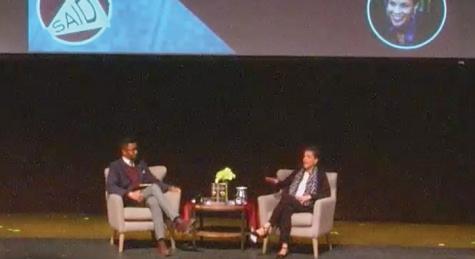
2 minute read
Ted Landsmark: The Pandemic as a Catalyst
The Pandemic as a Catalyst for a New Renaissance
TED LANDSMARK, M.ENV.D., J.D., PH.D.
Advertisement
Director, Kitty & Michael Dukakis Center for Urban & Regional Policy, Northeastern University, Boston
I grew up as a Black kid with polio in an East Harlem housing project. Limited mobility kept me away from trouble in the streets, guiding me instead to the public
library where I read vociferously. Polio and Blackness shaped my life for the better, creating the opportunity to envision something other than what I might have become. Reading gave me a perspective on how epidemics and race have transformed history. Diseases have devastated societies, as when 16th-century Europeans brought deadly viruses to the Americas. Pandemics have also cathartically catalyzed reflection and social improvement, as the tragedy of the Black Death led to the humanism of the Italian Renaissance, and as arduous polio vaccine research informed the search for a medical solution to AIDS.
This past summer I worked with Northeastern scholars recruited by the School of Public Policy for the Global Resilience Institute and a federal agency to propose planning strategies for a post-pandemic New England. We quickly saw the inter-connectedness of health, education, public safety, increased diversity and racial justice, housing, commerce, culture, public service, transportation, economic disparities, and human value challenges raised by the pandemic. Beyond providing short-term economic relief to enable cities and towns to re-open schools, support small businesses, reduce evictions and homelessness, and build broadband infrastructure, what longer-term goals and values might be considered for an equitable and inclusive regional recovery?
I also worked on curriculum changes to incorporate the community-based values of people of color. I questioned what “normal American” white supremacist society is. The inter-connectedness of potential relief strategies was underlined by the values expressed by demonstrators who catalyzed discussions of strategies to address centuries of state-sanctioned segregation and racial injustice. Black Lives Matter’s urgent advocacy has raised our consciousness in a time needing empathetic leadership. My scholarly colleagues and the general public are reflecting on longer-term approaches to addressing racial injustice, resilience, criminal justice, homelessness, cultural representations, and income inequalities.
From Boccaccio to Camus, humanities texts have chronicled the social, cultural, and political effects of health crises that transform societies. We understand that the mortality embedded in plagues can be a catalyst for re-considering the kindness, sharing, trust, faith, resilience, and forgiveness that enable us to overcome tragedies, and to neutralize our tendencies toward avaricious greed and untruthfulness. Other than becoming more innovative, resilient, and self-sustaining, what do we want to be as a culture? Ought we not to look to humanistic community values as guides to what lies ahead in the post-pandemic world?
My work this summer reinvigorated an awareness of what is ultimately important in life, i.e., values shaped by our immersion in the humanities. Equitable and inclusive humanistic values are the bedrock of the technical and commercial enterprises that drive our hopes, ambitions, and actions in a mercantile culture. The humanities are existential reflections on the values that make us human. Northeastern’s Humanities Center is a font of commitment to veritus, and I am pleased to work in a community with colleagues who express that humanistic commitment. Carpe diem.










